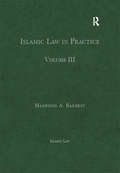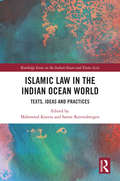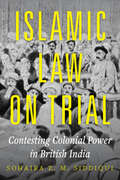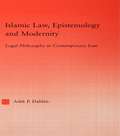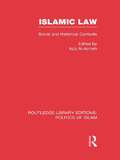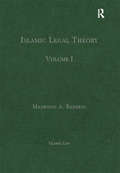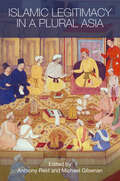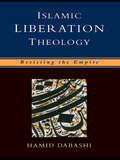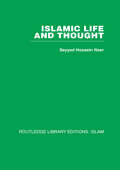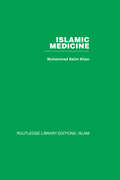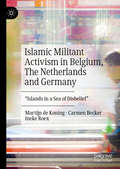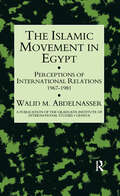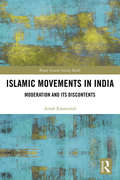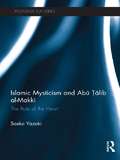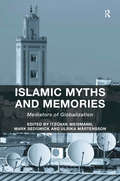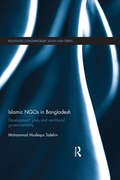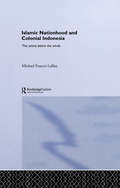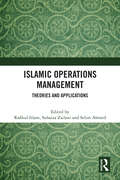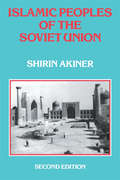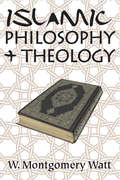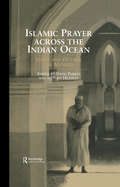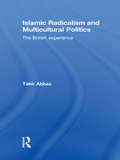- Table View
- List View
Islamic Law in Practice: Volume III (Islamic Law)
by Mashood A. BaderinIslamic law influences the lives of Muslims today as aspects of the law are applied as part of State law in different forms in many areas of the world. This volume provides a much needed collection of articles that explore the complexities involved in the application of Islamic law within the contemporary legal systems of different countries today, with particular reference to Saudi Arabia, Morocco, Indonesia, Nigeria, Turkey, Malaysia and Pakistan. The articles identify the relevant areas of difficulties and also propose possible ways of realising a more effective and equitable application of Islamic law in the contemporary world. The volume features an introductory overview of the subject as well as a comprehensive bibliography to aid further research.
Islamic Law in the Indian Ocean World: Texts, Ideas and Practices (Routledge Series on the Indian Ocean and Trans-Asia)
by Mahmood Kooria and Sanne RavensbergenThis book explores the ways in which Muslim communities across the Indian Ocean world produced and shaped Islamic law and its texts, ideas and practices in their local, regional, imperial, national and transregional contexts. With a focus on the production and transmission of Islamic law in the Indian Ocean, the chapters in this book draw from and add to recent discourses on the legal histories and legal anthropologies of the Indian Ocean rim as well as to the conversations on global Islamic circulations, legal history and anthropology of the Indian Ocean. By doing so, this book argues for the importance of Islamic legal thoughts and practices of the so-called "peripheries" to the core and kernel of Islamic traditions and the urgency to address their long-existing role in the making of historical and human experience of the religion. Arguing that Islamic law was and is not merely brought to, but also produced in the Indian Ocean world through constant and critical engagements, the book explores the ways in which Muslim communities in the Indian Ocean world shaped and continue to shape their lives and thoughts within the legal frameworks of their religion. The book takes a long historical perspective on Islamic law for a better understanding of the ways in which the oceanic Muslims have historically developed their religious, juridical and intellectual traditions. Transregional and transdisciplinary in its approach, this book will be of interest to scholars of Islamic Studies, Indian Ocean Studies, Legal History and Legal Anthropology, Area Studies of South and Southeast Asia and East Africa.
Islamic Law on Trial: Contesting Colonial Power in British India
by Dr. Sohaira Z. SiddiquiPrior to the East India Company’s establishment in India in 1661, Islamic law was widely applied by the Mughal Empire. But as the Company’s power grew, it established a court system intended to limit Islamic law. Following the Great Rebellion of 1857, the decentralized Islamic legal system was replaced with a new standardized system. Islamic Law on Trial interrogates the project of juridical colonization and demonstrates that alongside—and despite—the violent displacement of Muslim legal sovereignty, Muslims were able to engage with and even champion Islamic law from inside the colonial judiciary. The outcome of their work was a paradoxical legal terrain that appeared legitimate to both Muslim practitioners and English colonizers. Sohaira Siddiqui challenges long-standing assumptions about Islamic law under British rule, the ways in which colonial power displaced preexisting traditions, and how local Muslim elites navigated the new institutions imposed upon them.
Islamic Law, Epistemology and Modernity: Legal Philosophy in Contemporary Iran (Middle East Studies: History, Politics & Law)
by Ashk DahlenThis study analyses the major intellectual positions in the philosophical debate on Islamic law that is occurring in contemporary Iran. As the characteristic features of traditional epistemic considerations have a direct bearing on the modern development of Islamic legal thought, the contemporary positions are initially set against the established normative repertory of Islamic tradition. It is within this broad examination of a living legacy of interpretation that the context for the concretizations of traditional as well as modern Islamic learning, are enclosed.
Islamic Law, Gender, and Social Change in Post-Abolition Zanzibar
by Elke E. StockreiterAfter the abolition of slavery in 1897, Islamic courts in Zanzibar (East Africa) became central institutions where former slaves negotiated socioeconomic participation. By using difficult-to-read Islamic court records in Arabic, Elke E. Stockreiter reassesses the workings of these courts as well as gender and social relations in Zanzibar Town during British colonial rule (1890-1963). She shows how Muslim judges maintained their autonomy within the sphere of family law and describes how they helped advance the rights of women, ex-slaves, and other marginalised groups. As was common in other parts of the Muslim world, women usually had to buy their divorce. Thus, Muslim judges played important roles as litigants negotiated moving up the social hierarchy, with ethnicisation increasingly influencing all actors. Drawing on these previously unexplored sources, this study investigates how Muslim judges both mediated and generated discourses of inclusion and exclusion based on social status rather than gender.
Islamic Law: Social and Historical Contexts (Routledge Library Editions: Politics of Islam)
by Aziz Al-AzmehThis book underlines the mutability of Islamic law and attempts to relate its substantive and institutional varieties and transformations to social, political, economic and other historical circumstances. The studies in the book range from discussion of the received wisdom in Islamic law to studies of legal institutions and the theoretical means employed by Islamic law for the accommodation of changing historical circumstances. First published in 1988.
Islamic Legal Theory: Volume I (Islamic Law)
by Mashood A. BaderinIslamic legal theory (usÅ«l al-fiqh) is literally regarded as ’the roots of the law’ whilst Islamic jurists consider it to be the basis of Islamic jurisprudence and thus an essential aspect of Islamic law. This volume addresses the sources, methods and principles of Islamic law leading to an appreciation of the skills of independent juristic and legal reasoning necessary for deriving specific rulings from the established sources of the law. The articles engage critically with relevant traditional views to enable a diagnostic understanding of the different issues, covering both SunnÄ« and ShÄ«’Ä« perspectives on some of the issues for comparison. The volume features an introductory overview of the subject as well as a comprehensive bibliography to aid further research. Islamic legal theory is a complex subject which challenges the ingenuity of any expert and therefore special care has been taken to select articles for their clarity as well as their quality, variety and critique to ensure an in-depth, engaging and easy understanding of what is normally a highly theoretical subject.
Islamic Legitimacy in a Plural Asia (Routledge Contemporary Asia Series)
by Anthony Reid Michael GilsenanA global debate has emerged within Islam about how to coexist with democracy. Even in Asia, where such ideas have always been marginal, radical groups are taking the view that scriptural authority requires either Islamic rule (Dar-ul-Islam) or a state of war with the essentially illegitimate authority of non-Muslims or secularists. This book places the debate in a specifically Asian context. It draws attention to Asia (east of Afghanistan), as not only the home of the majority of the world’s Muslims but also Islam’s historic laboratory in dealing with religious pluralism. In Asia, pluralism is not simply a contemporary development of secular democracies, but a long-tested pattern based on both principle and pragmatism. For many centuries, Muslims in Asia have argued about the legitimacy of non-Islamic government over Muslims, and the legitimacy of non-Muslim peoples, polities and rights under Islamic governance. This book analyses such debates and the ways they have been reconciled, in South and Southeast Asia, up to the present. The evidence presented here suggests that Muslims have adapted flexibly and creatively to the pluralism with which they have lived, and are likely to continue to do so.
Islamic Liberation Theology: Resisting the Empire
by Hamid DabashiThis book is a radical piece of counter-intuitive rethinking of the clash of civilizations theory and global politics. In this richly detailed criticism of contemporary politics, Hamid Dabashi argues that after 9/11 we have not seen a new phase in a long running confrontation between Islam and the West, but that such categories have in fact collapsed and exhausted themselves. The West is no longer a unified actor and Islam is ideologically depleted in its confrontation with colonialism. Rather we are seeing the emergence of the US as a lone superpower, and a confrontation between a form of imperial globalized capital and the rising need for a new Islamic theodicy. The combination of political salience and theoretical force makes Islamic Liberation Theology a cornerstone of a whole new generation of thinking about political Islamism and a compelling read for anyone interested in contemporary Islam, current affairs and US foreign policy. Dabashi drives his well-supported and thoroughly documented points steadily forward in an earnest and highly readable style.
Islamic Life and Thought
by Seyyed Hossein NasrThis collection of essays by one of the best known contemporary Muslim scholars writing in English covers many facets of Islamic life and thought. The author has brought together studies dealing with the practical as well as intellectual aspects of Islam in both their historical and contemporary reality. The contemporary significance of themes such as religion and secularism, the meaning of freedom, and the tradition of Islamic science and philosophy is given particular attention.
Islamic Medicine
by Muhammad Salim KhanOriginally published in 1986, this volume deals with the historical, philosophical and psychological concepts found in Islamic medical practices, and covers Islamic ideas on physiological, pathological, curative and preventative medicine. This was the first systematic study of Islamic medicine to be published in the English language and continues to have much relevance at a time when interest both in Islamic thought and in alternatives to conventional medicine is strong.
Islamic Militant Activism in Belgium, The Netherlands and Germany: "Islands in a Sea of Disbelief"
by Martijn de Koning Carmen Becker Ineke RoexBased on ethnographic research in Belgium, The Netherlands, and Germany, this book presents a novel approach to studying Muslim militant activism. While much existing research focuses on the process of radicalization, these authors introduce a different set of questions that investigate specific modes of activism, and their engagement with dominant discourses and practices in media and state policies. Drawing on social movement theory and Foucault’s work on counter-conduct, this research explores how daʿwa networks came about, and how activists developed themselves in interaction with state and media practices. This perspective highlights a form of activism and resistance in which activists turn against policies and debates centring on Muslims and Islam, while attempting to create and protect an alternative space for themselves in which they can experience Islam according to their own perception of it. The study will contribute to debates about resistance, social movements and militant activism among Muslims in Europe.
Islamic Movement In Egypt
by AbdelnasserFirst published in 1994. Routledge is an imprint of Taylor & Francis, an informa company.
Islamic Movements in India: Moderation and its Discontents (Royal Asiatic Society Books)
by Arndt-Walter EmmerichThis book analyses the emerging trend of Muslim-minority politics in India and illustrates that a fundamental shift has occurred over the last 20 years from an identity-dominated, self-serving and inward-looking approach by Muslim community leaders, Islamic authorities and social activists that seeks to protect Islamic law and culture, towards an inclusive debate centred on socio-economic marginalisation and minority empowerment. The book focuses on Muslim activists, and members and affiliates of the Popular Front of India (PFI), a growing Muslim-minority and youth movement. Drawing on qualitative fieldwork undertaken since 2011, the author analyses recent literature on Muslim citizenship politics and the growing involvement of Islamist organisations and movements in the democratic process and electoral politics to demonstrate that religious groups play a role in politics, development, and policy making, which is often ignored within political theory. The book suggests that further scrutiny is needed of the assumption that Muslim politics and Islamic movements are incompatible with the democratic political framework of the modern nation state in India and elsewhere. Contributing to a more nuanced understanding of how Islamic movements utilise various spiritual, organisational and material resources and strategies for collective action, community development and democratic engagement, the book will be of interest to academics in the field of political Islam, South Asian studies, sociology of religion and development studies.
Islamic Mysticism and Abu Talib Al-Makki: The Role of the Heart (Routledge Sufi Series)
by Saeko YazakiBoth in everyday language and religious metaphor, the heart often embodies the true self and is considered to be the seat of emotion in many cultures. Many Muslim thinkers have attempted to clarify the nature of Sufism using its metaphorical image, particularly in the tenth and eleventh centuries. This book examines the work of Abū Tālib al-Makkī and his wider significance within the Sufi tradition, with a focus on the role of the heart. Analysing his most significant work, Qūt al-qulūb (‘The Nourishment of Hearts’), the author goes beyond an examination of the themes of the book to explore its influence not only in the writing of Sufis, but also of Hanbalī and Jewish scholars. Providing a comprehensive overview of the world of al-Makkī and presenting extracts from his book on religious characteristics of the heart with selected passages in translation for the first time in English, this book will give readers a better understanding not only of the essential features of Sufism, but also the nature of mysticism and its relation to monotheistic faiths.
Islamic Myths and Memories: Mediators of Globalization
by Itzchak WeismannIslamic myths and collective memory are very much alive in today’s localized struggles for identity, and are deployed in the ongoing construction of worldwide cultural networks. This book brings the theoretical perspectives of myth-making and collective memory to the study of Islam and globalization and to the study of the place of the mass media in the contemporary Islamic resurgence. It explores the annulment of spatial and temporal distance by globalization and by the communications revolution underlying it, and how this has affected the cherished myths and memories of the Muslim community. It shows how contemporary Islamic thinkers and movements respond to the challenges of globalization by preserving, reviving, reshaping, or transforming myths and memories.
Islamic NGOs in Bangladesh: Development, Piety and Neoliberal governmentality (Routledge Contemporary South Asia Series)
by Mohammad Musfequs SalehinNGOs (Non-Governmental Organizations) have emerged in both a development and aid capacity in Bangladesh, providing wide-reaching public services to the country’s population living in extreme poverty. However, resistance to and limitations of NGO-led development - which in conjunction with Bangladesh’s social transformation - led to a new religious-based NGO development practice. Looking at the role of Islamic NGOs in Bangladesh, the book investigates new forms of neoliberal governmentality supported by international donors. It discusses how this form of social regulation produces and reproduces subjectivities, particularly Muslim women subjectivity, and has combined religious and economic rationality, further complicating the boundaries and the relationship between Islam, modernity, and development. The book argues that both secular and Islamic NGOs target women in the name of empowerment but more importantly as the most reliable partners to meet their debt obligations of micro-financing schemes, including shari’a-based financing. The targeted women, in turn, experience Islamic NGOs as less coercive and more sensitive to their religious environment in the rural village community than are secular NGOs. Providing a comparative study of the role of religious and secular NGOs in the implementation of neoliberal policies and development strategies, this book will be a significant addition to research on South Asian Politics, Development Studies, Gender Studies, and Religion.
Islamic NGOs in Bangladesh: Development, Piety and Neoliberal governmentality (Routledge Contemporary South Asia Series)
by Mohammad Musfequs SalehinNGOs (Non-Governmental Organizations) have emerged in both a development and aid capacity in Bangladesh, providing wide-reaching public services to the country’s population living in extreme poverty. However, resistance to and limitations of NGO-led development - which in conjunction with Bangladesh’s social transformation - led to a new religious-based NGO development practice. Looking at the role of Islamic NGOs in Bangladesh, the book investigates new forms of neoliberal governmentality supported by international donors. It discusses how this form of social regulation produces and reproduces subjectivities, particularly Muslim women subjectivity, and has combined religious and economic rationality, further complicating the boundaries and the relationship between Islam, modernity, and development. The book argues that both secular and Islamic NGOs target women in the name of empowerment but more importantly as the most reliable partners to meet their debt obligations of micro-financing schemes, including shari’a-based financing. The targeted women, in turn, experience Islamic NGOs as less coercive and more sensitive to their religious environment in the rural village community than are secular NGOs. Providing a comparative study of the role of religious and secular NGOs in the implementation of neoliberal policies and development strategies, this book will be a significant addition to research on South Asian Politics, Development Studies, Gender Studies, and Religion.
Islamic Nationhood and Colonial Indonesia: The Umma Below the Winds (SOAS/Routledge Studies on the Middle East)
by Michael Francis LaffanDrawing on previously unavailable archival material, this book argues that Indonesian nationalism rested on Islamic ecumenism heightened by colonial rule and the pilgrimage. The award winning author Laffan contrasts the latter experience with life in Cairo, where some Southeast Asians were drawn to both reformism and nationalism. After demonstrating the close linkage between Cairene ideology and Indonesian nationalism, Laffan shows how developments in the Middle East continued to play a role in shaping Islamic politics in colonial Indonesia.
Islamic Operations Management: Theories and Applications
by Rafikul Islam Suhaiza Zailani Selim AhmedManaging operations is an integral part of all business and comprises a number of components, including quality management, production planning, supply chain management, logistics, and inventory control. The effective management of operations plays a defining role in enhancing business efficiency and is a lynchpin for success.This book explores how Islamic principles and tools can be applied to improve operations management across industries. While Islamic banking and finance are established disciplines, there is yet little evidence of how exploring operations management from an Islamic lens can improve efficiency. Bringing together leading scholars across subdisciplines, the Editors fill the long-standing gap and address the rising demand for halal products and services by providing a unique perspective to define and enhance an important, growing field.This book will be a useful reference for those who wish to understand all aspects of Islamic business operations and halal logistics. The book will be helpful to academics, researchers, and upper level students, in particular to those who are looking to further their research on how Islamic principles can be applied to business operations.
Islamic Peoples Of The Soviet Un
by AkinerFirst published in 1987. Routledge is an imprint of Taylor & Francis, an informa company.
Islamic Philosophy and Theology: An Extended Survey (The\new Edinburgh Islamic Surveys Ser.)
by W. Montgomery WattEvents are making clear to ever-widening circles of readers the need for something more than a superficial knowledge of non-European cultures. In particular, the blossoming into independence of numerous African states, many of which are largely Muslim or have a Muslim head of state, has made clear the growing political importance of the Islamic world, and, as a result, the desirability of extending and deepening the understanding and appreciation of this great segment of mankind. Islamic philosophy and theology are looked at together in a chronological framework in this volume. From a modern standpoint, this juxtaposition of the two disciplines is important for the understanding of both; but it should be realized at the outset that it is a reversal of the traditional Islamic procedure. Not merely were the disciplines different, but in the earlier centuries the exponents were two different sets of persons, trained in two different educational traditions, each with its own separate institutions. There was little personal contact between philosophers and theologians, and the influence of the two disciplines on one another was largely by way of polemics. Eventually while philosophy died out as a separate discipline in the Islamic world, many parts of it were incorporated in theology. This work is designed to give the educated reader something more than can be found in the usual popular books. The work undertakes to survey a special part of the field, and to show the present stage of scholarship. Where there is a clear picture this will be given; but where there are gaps, obscurities and differences of opinion, these will also be indicated. This work is brilliant in its design, style, and intimate understanding. It is a must read for specialists and policy makers alike.
Islamic Politics, Muslim States, and Counterterrorism Tensions
by Peter HenneThe US Global War on Terror and earlier US counterterrorism efforts prompted a variety of responses from Muslim states despite widespread Islamic opposition. Some cooperated extensively, some balked at US policy priorities, and others vacillated between these extremes. This book explains how differing religion-state relationships, regimes' political calculations, and Islamic politics combined to produce patterns of tensions and cooperation between the United States and Muslim states over counterterrorism, using rigorous quantitative analysis and case studies of Pakistan, the United Arab Emirates, and Turkey. The book combines recent advances in the study of political institutions with work on religion and politics to advance a novel theory of religion and international relations that will be of value to anyone studying religion, terrorism, or Islamic politics. It also provides numerous insights into current events in the Middle East by extending its analysis to the Arab Spring and the rise of the Islamic State.
Islamic Prayer Across the Indian Ocean: Inside and Outside the Mosque (Routledge Indian Ocean Series)
by David Parkin Stephen HeadleyIn its attempt to squash the influence of animism and pantheism or polytheism and to promote the idea of the One and Only Absolute God, Islam has come up against a tendency within itself to incorporate certain local religious traditions and practices. This book shares that combination of universality and local particularity, exploring this paradox and the contradictory tendencies contained in it.
Islamic Radicalism and Multicultural Politics: The British Experience
by Tahir AbbasThe expression of an Islamic political radicalism in Britain has been one of the most dramatic developments in recent decades. Islamic Radicalism and Multicultural Politics explores the nature of this phenomenon by analysing the origins of Islam and its historical contact with Western Europe and Britain, and the emergence of Islamic political radicalism in the Muslim world and in the West. Tahir Abbas draws on historical analysis and contemporary case studies to explore the post-war immigration and integration of Muslim groups, the complex relations that exist between a secular liberal Britain and a diverse but multifaceted Islam, and the extent of social and economic inequalities that affect Muslims as individual citizens and in local area communities. He shows how violent extremism among British Muslims is in reality influenced by a range of issues, including the factors of globalisation and contemporary politics, media and culture. Analysing and dissecting public policy, Abbas offers suggestions for tackling the major social, political and economic questions facing British Muslims in the post-7/7 era. An important contribution to the study of religion, ‘race’ and ethnicity in modern Britain, this accessible work will be of interest to anyone working in the field of Islamic studies, sociology and political radicalism. Cover design by Mahtab Hussain, www.mahtabhussain.com
